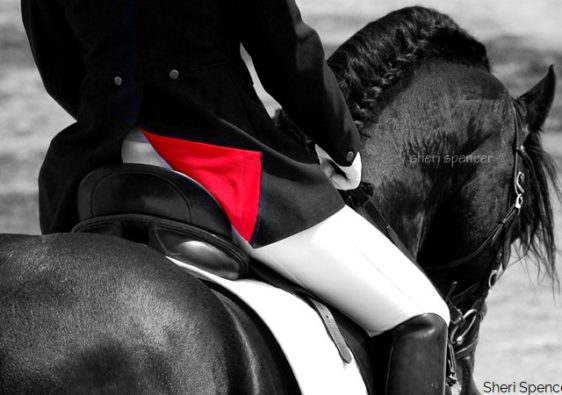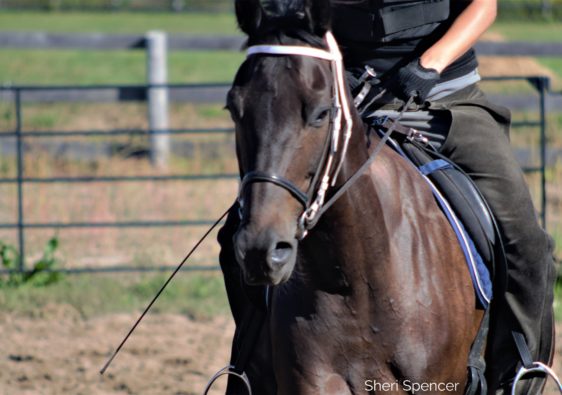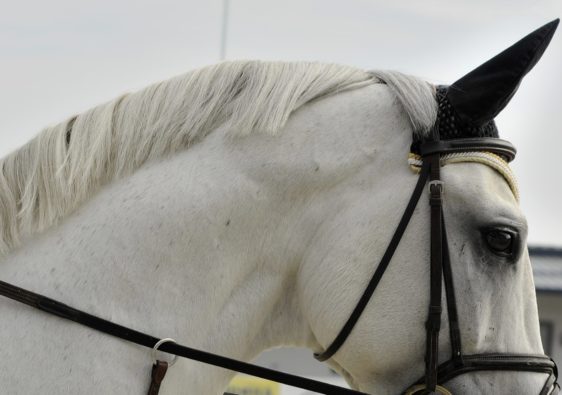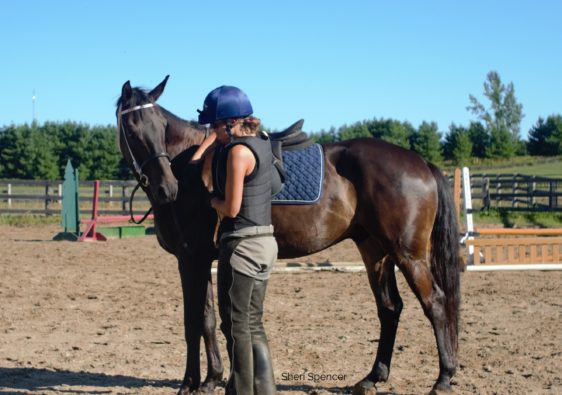When I started this blog around the same time I started playing with a new “project” horse, in the beginning I ended up not writing nearly as much as I thought I would. It wasn’t out of laziness or procrastination (as is all too easy with writing), but mostly because a) I wasn’t sure if what I was doing would actually work with this one (he is[was] by far the most extreme case I’ve worked with), and b) I was afraid I was going to jinx myself.
Yes. When it comes to training young, green, explosive horses, my superstitions can get the better of me… probably because no matter what you think you know, you just never know, and if throwing salt over my shoulder and praying to the “gods of the indoor” might help, where’s the harm in trying? As long as I don’t do it in such a manner as might spook him, of course.
Now saying that, I’ll probably get bucked off tomorrow (I’ll keep you posted), but I can say, with absolute certainty, that at least one element of my approach to this young firecracker has been a good one:
Every. Single. Lesson… our primary focus, without fail or exception, is relaxation.
If he’s having an off day, if it’s windy, if a horse just left, if the pigeons are circling, we focus on relaxation.
Now, you can’t exactly put on a sound effects machine and play ocean waves for him, or take him to a yoga retreat, but you can be non-reactive to his OHMYGODTHESKYISFALLING, and just ask him to do something simple, like, say, walk over that pole that happens to be laying on the ground there and distract him from the scary thing with something simple. Take his mind off it. Give him a simple puzzle.
I like to call these “brain exercises” … because while navigating pole mazes (or similarly distracting gymnastics), they take their mind off the thing that’s upsetting them and gives them a puzzle to figure out, something else to think about. It’s simply a method of redirecting their energy and their focus while giving them the security of being able to move.
It’s not always easy. No one said it was going to be. But it helps. A lot.
What helps even more is if you, the handler, can set the tone by being the calm leader to inspire a hopefully-calm “playmate”.
It means letting go of expectations, of ego, of worrying about what that person watching you is thinking, and just being a calm, confident leader. Be the anchor to their helium-filled balloon. The roots to their wind-whipped branches… You get the idea.
It’s totally okay if they’re afraid or nervous or upset, just keep yourself calm, and just simplify the exercise if they’re frustrated or over-faced, or give them something else to pay attention to to get them focused again. Be creative and open-minded.
I’m over-generalizing this by a landslide, and will break this stuff down into pieces and specific “games” later, but the main idea is this:
A nervous horse needs a confident leader.
A fearful horse needs a leader they trust.
A mischievous horse needs a leader that can outsmart them.
All of those “leader” traits can come through with consistent and attentive training, persistence, and patience. You don’t need to be a bully. Contrary to the old adage, you don’t even need to be adamant about “being the boss” – as long as you set and maintain your boundaries for personal space, you just have to be smarter, calmer, and adaptable.
You never need to get angry (and it’s much better if you don’t). But if you want a horse to want to work, you need to be someone worth listening to.
Sure sure, we can argue “that’s nice in theory” or “that’ll never work with my horse!” But I dare you to try.
Eleven months ago I started playing with a horse labelled “psycho”, “crazy”, “dumb”, “stupid”, “weird” and even “dangerous”, but after three months of never punishing him for being afraid, for redirecting his energy, for encouraging him to be curious, I had a horse that trusted me, that behaved differently for me than he did with others. Two months after that, he was relaxed and confident under saddle, and he was starting to trust other people too. Now? I can trust him. He’s relaxed. He’s quiet. He loves to come out and “play”. We’ve gone out on field hacks – just the two of us – and we’ve trotted out there, with “brakes” that work. He doesn’t spook at the wind, plastic bags or pigeons, and if something startles him, if I talk to him to settle him, he listens and responds.
Because sometimes those nervous horses just need someone to trust, someone who gives them the benefit of the doubt, someone who gives them the chance to try again. They want a calm, confident leader.
Thus concludes this thought-diarrhea for the day.




